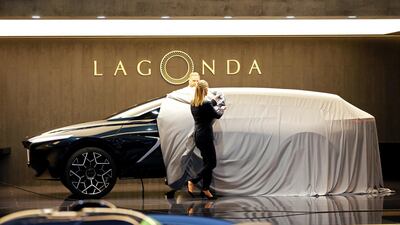For car company executives, there’s only one place to be this week; the Geneva Motor Show opens on Thursday and, as one may expect in a city that is a byword for luxury, nothing else on the industry calendar serves up so much glitz and glamour.
The days of scantily clad models draped over the bonnets of sparkling new saloon cars may be consigned to the history books; but Geneva’s beautiful waterside setting is the perfect place to flaunt high-end vehicles to equally high-end customers. For brands like Ferrari, Lamborghini, Bentley and Aston Martin this is where to find buyers with wrists artistically wrapped in locally crafted timepieces and wallets bedecked with purposeful plastic.
Yet amid the well-heeled wheeling and dealing, most would admit a chill wind is blowing across the pristine waters of Lake Geneva. It’s been a turbulent few months for the car industry already experiencing profound flux and disruption.
Honda’s announcement that it intends to close its once crucial European manufacturing hub in Swindon, a town in south-west England, was less about Brexit than about a broader trend among Japanese manufacturers seeking to draw production back home. That, however, will be scant consolation to about 7,000 people whose jobs may ultimately be lost as a result.
It was a bad week elsewhere in the UK, too, with James Bond’s car provider of choice, Aston Martin, taking a stock market Skyfall. Shares collapsed by 40 per cent of their debut value after details of the luxury sports car company’s IPO-fuelled losses reached investors.
Tesla is also having a bumpy ride, with CEO Elon Musk announcing not one, but two new cars in as many weeks: the first, the much-vaunted lower priced Model 3; followed by a 4x4 known as the Model Y. Both are designed to broaden Tesla’s appeal and bolster sales. The firm will also soon sell its wares exclusively online, cutting costs but also jobs in the process. Investors weren’t convinced, with one referring to the Model 3 announcement as the "un-iPhone moment". Ouch.
Elsewhere news was less about job losses and more about new directions. Ford and Volkswagen, two automotive titans in transition, are reportedly cosying up in the world of autonomous vehicles. Both companies need a win. VW has yet to see sales recover from the devastating "dieselgate" emissions scandal, while the reputational damage caused may take longer still. Ford is shifting its focus to burly trucks and 4x4s in the United States, and away from less lucrative models like the little Fiesta.
Back in 2017, Ford invested in a start-up called Argo AI, which is developing self-driving car technology. VW, already collaborating with its American counterpart, is apparently taking a 50 per cent stake in Argo, with a $600 million (Dh2.2 billion) equity investment followed up by a further $1.1bn in working capital for R&D, according to the Wall Street Journal.
The move is, of course, part of the big thing everyone in the industry is talking about: 5G, the next generation in mobile service, has sent companies scrambling for autonomous tech partners as the idea of self-driving cars grows ever more realistic. Mr Musk believes that by the end of next year, regulatory approval permitting, drivers will be able to sit back and browse the internet, sip coffee and put on their make-up instead of driving. (I’m sure I’ve seen drivers doing all of the above in normal cars today while moving, but that’s an entirely different story).
But it’s not just the self-driving car phenomenon that is changing the industry. The very concept of car ownership is in question among younger people. A recent study in Chicago by Arity - a transport tech and data company - found over half of adults between 22 and 37 years old say a car is just not worth the cost of upkeep, and they would prefer not to drive at all. In fact, almost half of all respondents in the study said they don’t particularly enjoy driving.
Maybe they’ll grow into car ownership eventually, but right now millennials are helping drive the growth in ride sharing on their global travels. In its latest foray around the world, Uber is reportedly preparing a move to take on the UAE’s Careem. Valuations topping $3bn are being bandied around.
For UAE residents, you have either just arrived at your destination after a lengthy car journey, or you’re about to take one. For some in the Emirates the average commute may be more than 90 minutes, which even for someone living in New York feels somewhat punitive. Cars and congestion are certainly a feature of Emirates life.
So, as you peruse the exotic machinery on display in Geneva this week, don’t forget to ponder what might be going on behind the scenes. The changes happening in the car industry right now are profound; and their impact on daily life in places like Dubai and Abu Dhabi could be equally transformative.
First Move with CNN anchor Julia Chatterley airs weekdays at 6pm GST on CNN International.

